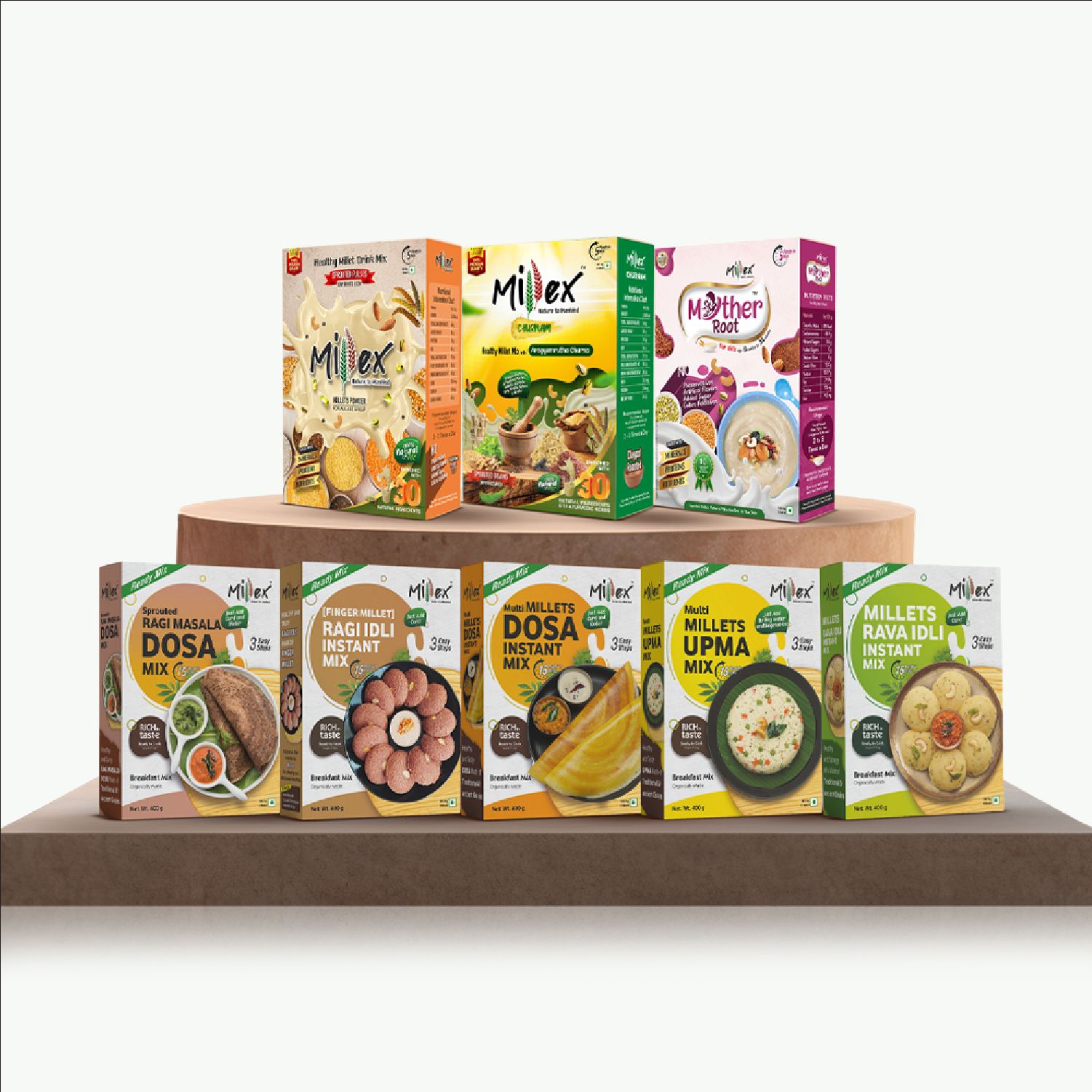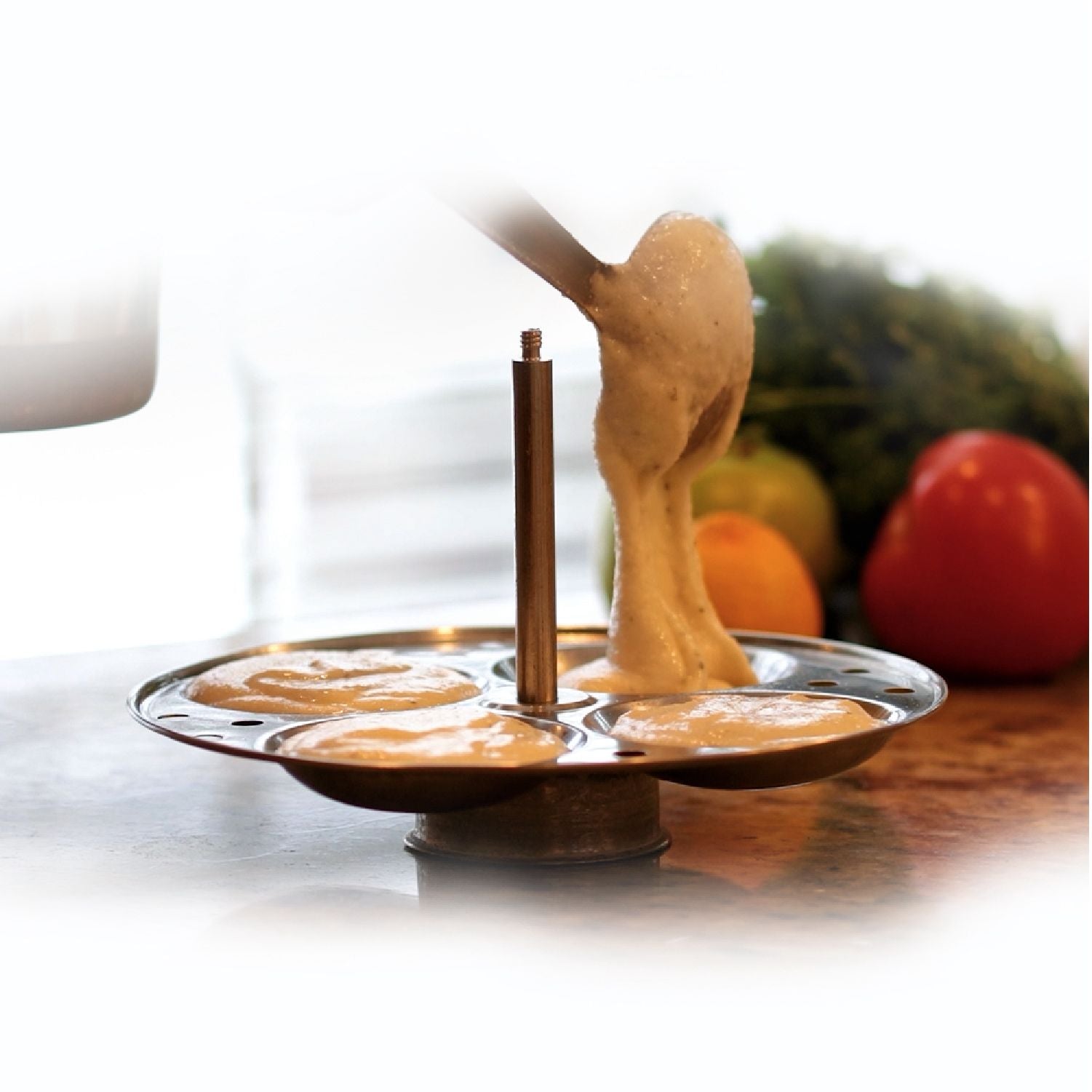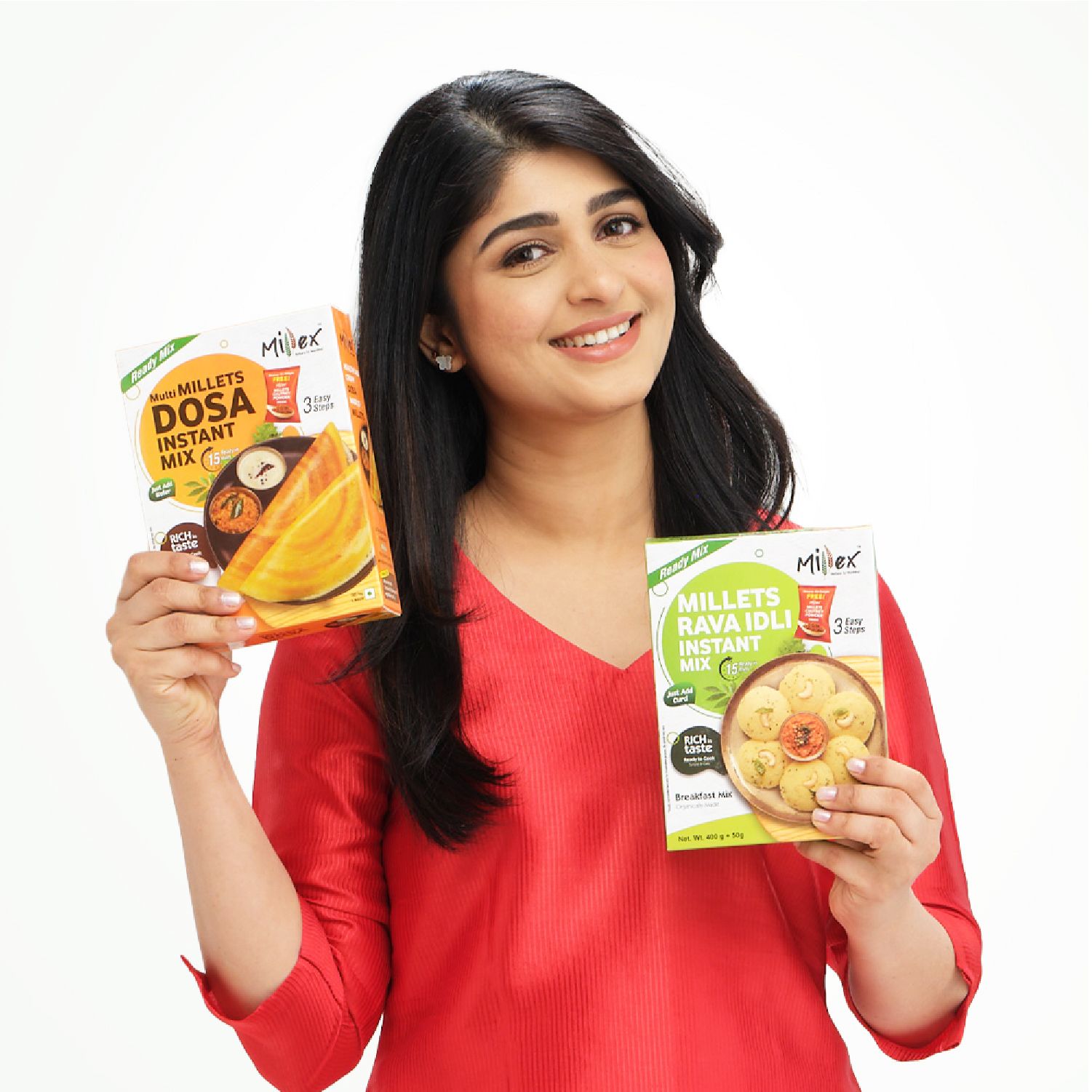Is Maida Slowly Harming Your Body? Shocking Side Effects Revealed
Bloated stomach, sudden energy crashes, and constant cravings. Does this sound familiar? These daily struggles you might face can be attributed to one cunning ingredient, which is maida. Maida is present in daily foods like biscuits, breads, and snacks, which can contribute nothing but a lack of nutrition and poor health. The maida side effects include poor digestion, weight gain, and even dangerous blood sugar spikes. Switching to a healthier alternative is no longer smart, and it is vital.
Millets are among the healthier substitutes for maida. Whole grains like millets contain abundant fibre and essential elements that support digestive health and provide long-lasting vitality. At Millex, we emphasise providing only healthy, hygienically prepared, ready-to-cook products. Our range of products, including Millet Rava Idli Instant Mix and Multi Millet Dosa Instant Mix, ensures that healthy eating is both convenient and delicious. Now let us discuss the risks associated with maida and some better alternatives for maida.
What is Maida?
Before jumping into why maida is bad for you, let us first know what maida is. All-purpose flour, commonly referred to as maida, is made from wheat by removing the germ and bran, leaving behind just the starchy core. This makes it into a fine, smooth form and has a longer shelf life, but it removes vital nutrients such as fibre and minerals.
Maida is widely used in cooking and baking to prepare soft cakes, pastries, breads, and dried foods. Though versatile, maida has no nutritional value, so it is essential to eat it in moderation and seek out healthier flour options such as millets.
Side Effects & Risks Of Maida
Maida, also referred to as “White Poison”, is a highly refined flour that is produced by removing the fibre and nutrients from wheat until 97% of it is lost in processing. To give it a better appearance and texture, it is bleached and treated with chemicals that can damage your health. While being widely available in most foods, if consumed normally, maida can cause severe health issues, and therefore, healthier and more nutritious options should be sought after.
● Digestive Problems
Maida is deficient in dietary fibre, which is an essential component that helps keep the digestive system healthy. Because of its low fibre level, maida is hard to digest and tends to cause constipation, bloating, and uneven bowel movements. Prolonged consumption can disrupt gut function and cause discomfort after consuming.
● Higher Risk of Diabetes
Maida has a high glycemic index that leads to an immediate increase in blood glucose. This puts pressure on the pancreas and can lead to reduced sensitivity to insulin. Regular consumption over a period may add to the risk of type 2 diabetes, particularly among people who have a sedentary lifestyle or have poor dietary habits.
● Risk of Obesity
Regular consumption of maida-based food may result in weight gain. Its refined content leads to quick absorption of sugar and interferes with the release of satiety hormones, making you hungry again earlier. This results in overeating and fat deposition, leading to obesity and all its associated complications.
● Heart Problems
Maida consumption is associated with higher amounts of bad cholesterol (LDL) in the body. Increased LDL levels are one of the greatest risk factors for heart-related complications, such as heart attacks and strokes. Regular intake of refined white flour may eventually result in chronic heart-related issues.
● Damage the Gut
Maida is commonly called the “glue to the gut,” which fills the digestive tract. Its adhesive property complicates the body's elimination of waste, impacting gut health. On the other hand, fibre foods cleanse the digestive tract and promote healthy digestion.
● May Weaken Immunity
Prolonged inflammation caused by refined flour can burden the adrenal system and weaken the body's defense mechanisms. Maida lacks important nutrients such as vitamin C, zinc, iron, and B vitamins, which can lead to deficiencies that reduce immune cell function and make the body more vulnerable to infections.
● Increased Risk of Chronic Disease
Maida leads to a sudden blood glucose increase and causes insulin resistance as well as systemic inflammation. These are all major contributors to the development of chronic diseases like diabetes and cardiovascular disease. Its absence of fibre and nutrients makes these threats worse.
Better Alternatives for Maida
As discussed earlier, continuous consumption of maida leads to digestive issues, diabetes, and obesity. But the good news is that you don't have to compromise on your favourite food. You can just switch to the following healthier alternatives:
● Ragi Flour
Ragi, also known as finger millet or nachni, is loaded with calcium, iron, protein, antioxidants, and dietary fibre. It is a naturally gluten-free flour that is both easy to digest and promotes overall health and nutrition. Ragi contains a high glycemic index, but with its high fibre content, the blood sugar levels are kept under control. It is very versatile, and it can be used to prepare rotis, idlis, dosas, biscuits, cookies, and even cake.
To enjoy the benefits of ragi flour, Millex offers Healthy Millet Mix Without Churnam and Millex Mother Root, which contains ragi. Preparing it is easier. Just open, cook, and serve. Your healthy yet delicious ragi meal will be ready.
● Wheat Flour
Wheat flour is a staple substitute for maida, with a more nutritious, bran and germ-rich offering. Refined maida loses its fibre and nutrients and hence becomes difficult to digest. But wheat flour is digestible and more satisfying. It is used excessively in chapatis and parathas, as well as when baking breads and muffins. It is a minimal change, adding more value to regular meals.
● Almond Flour
Almond flour is rich in healthy fats and low in carbs, making it a keto favourite. The nutty taste is perfect for use in baked foods such as muffins, cakes, and cookies. Nutrient-dense almond flour can help decrease the amount of added fats in recipes.
● Coconut Flour
Coconut flour is a high-protein, vegan-friendly, gluten-free flour. It is perfect for making pancakes, cookies, and bread. You can add eggs or additional baking powder to your recipes because it is gluten-free.
● Buckwheat Flour
Kuttu atta, or buckwheat flour, contains a high amount of fibre and natural compounds that protect the body from oxidative damage. It is gluten-free and can be used to make pancakes, pizza bases, and breads. It promotes digestive health and assists in providing stable energy levels.
● Tapioca Flour
Tapioca flour is made from cassava root and is ideal for gluten-free baking. It also functions as a natural thickener and can be used to make crispy pasta bases and doughnuts.
● Quinoa Flour
Quinoa flour contains high protein and antioxidants. This is a bit expensive, but its great texture and taste make it ideal for baking products such as muffins and breads. Quinoa flour is low on the glycemic index and improves your gut health.
● Banana Flour
These are made from raw bananas, which act as a thickener. It mixes well in milkshakes and smoothies and is excellent for baking banana bread, cupcakes, and muffins.
● Soy Flour
Soybean powder is packed with protein, folic acid, calcium, and iron, making it a highly nutritious option. It can be used to make various dishes like dosas, parathas, cakes, and pancakes. Replacing maida with soy flour is a smart way to avoid maida health risks while still enjoying delicious and nutritious meals.
Replacing maida with such healthier flour can increase the nutritional value of your food without affecting the taste. Experiment with these alternatives to aid better digestion, help regulate blood sugar, and enhance your overall health.
Tips to Reduce Maida Intake
Cutting down on maida (refined flour) in your regular meals can really work wonders for your overall health and digestion. Here are some tips to help you make better decisions:
● Choose Whole Grain Products
Use whole grain options such as whole wheat bread, brown rice, multigrain pasta, and millet-based snacks instead of refined flour products. Whole grains contain a lot of fibre and nutrients, which regulate blood sugar and enhance digestion.
● Cook at Home
Preparing meals in your own kitchen allows you to fully manage what goes into your food. It minimises your risk of eating processed food that tends to contain secret maida. Experiment with flours such as ragi, whole wheat, or buckwheat in your dishes.
● Read Food Labels
While you shop, always check the products on the labels. Pick products with the designation “whole grain” or “whole wheat” and avoid those that contain “refined flour” or “maida” as a key ingredient.
● Snack Smart
Avoid maida-rich snacks like biscuits, cakes, and white bread sandwiches. Opt for better options like roasted nuts, fresh fruits, or whole grain crackers instead. These satiate you and provide improved nutrition.
Millex: Smart Swap for Maida!
Maida is a staple ingredient in most foods eaten daily, but the long-term impact of refined carbs and health cannot be disregarded. The overuse of refined flour deprives your body of vital nutrients and affects overall health. Choosing food wisely is the first step towards a healthier and more vibrant life.
Replacing maida with millets like ragi flour is an effortless method to reduce maida and increase your nutrition. Millex offers various healthy, ready-to-cook millex mixes such as Ragi Idli Instant Mix, Sprouted Ragi Masala Dosa Mix, and Millex Millet Health Drink Mix with Churnam, which has ragi as one of its key ingredients. Say goodbye to maida. Choose Millex today!





